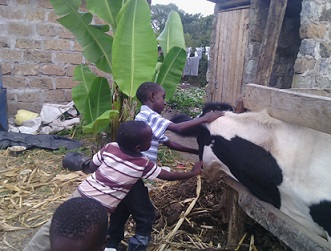Microcredits continue to enable Kenyan women to build their businesses.
Thanks to Mike Calvert from York St John University for this update. Please click on the ‘Microcredits’ category on the right to see the previous entries from Nairobi
Readers of the last blog entry will have seen the news that the Kenya women entrepreneurs are going from strength to strength and I promised pictures of Jacinta’s cow. The photos arrived today and I am keen to share them (Daisy and Jacinta’s three boys). I am pleased to say that the funding is continuing to offer social, emotional and spiritual support as well as welcome economic capital to enable the women to fulfil their business potential.
 The women report that that, as well as experiencing financial benefits, they are also more confident and sure of themselves. Their standard of living has improved and their partners’ perceptions have changed. The most striking example of a success story is Jacinta who is continuing to diversify from her shop and canteen by purchasing Daisy the cow (I must confess to interfering in the naming of the beast) whose milk is supplying the business, satisfying domestic consumption and is being offered for sale. Other successes include Alice who is currently having difficulty meeting the demand for eggs and is hoping to increase her brood to 1600 (from an original stock of about 500).
The women report that that, as well as experiencing financial benefits, they are also more confident and sure of themselves. Their standard of living has improved and their partners’ perceptions have changed. The most striking example of a success story is Jacinta who is continuing to diversify from her shop and canteen by purchasing Daisy the cow (I must confess to interfering in the naming of the beast) whose milk is supplying the business, satisfying domestic consumption and is being offered for sale. Other successes include Alice who is currently having difficulty meeting the demand for eggs and is hoping to increase her brood to 1600 (from an original stock of about 500).
A fifth member, Rispa, has joined the group that now goes under the title of Sujali Self Help Group (SSHG) and she is being inducted into the group and hopes to borrow money to enter the organic egg production. Overdrafts are being taken up and this is providing additional short-term borrowing potential. Alice, Eunice, Jacinta and Rispa have all benefitted from these overdrafts and have paid back in full on time.
 The key factors in their success appear to be low interest rates (5%), clear leadership from Mary, a strong internal support system and clear business goals.
The key factors in their success appear to be low interest rates (5%), clear leadership from Mary, a strong internal support system and clear business goals.
It is important to note, however, that they recognise the challenges that they face. First of all, they need to stay on track and not over-diversify. Secondly, they must borrow and use the money for their businesses and not be tempted to use the money to address any non-business-related pressures (such as school fees, medical fees or other expenditure). Thirdly, they need to be more sophisticated in their financial management and recordkeeping.
In late August, the women are going to receive training in bookkeeping and financial management so that they can record their earnings and identify where the money is coming from and going to. The women have also drawn up some protocols governing their behaviour and interaction. It even includes fines for late arrival and non-attendance at meetings.
I will visit the businesses in October and report back. In the meantime, if anyone is interested in providing additional funding for the women, I would love to hear from you.
Mike Calvert m.calvert2@yorksj.ac.uk